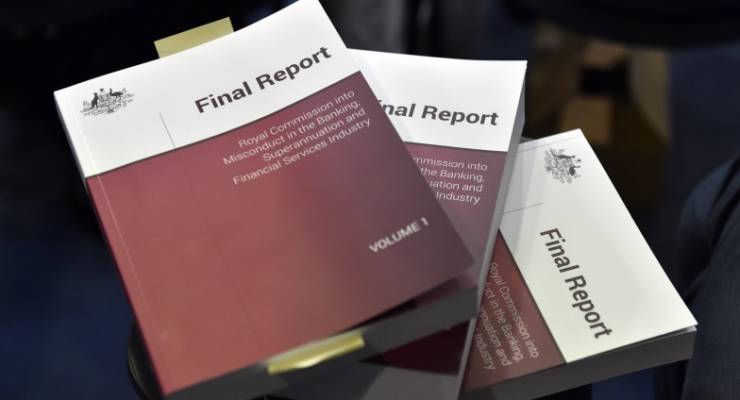
Financial services royal commissioner Kenneth Hayne has struggled with, but ultimately failed to address, the systemic problems of Australia’s financial industry. His recommendations for reform — common sense in many areas, timid and tepid in others — won’t address the deep-seated faults that drive the industry-wide misbehaviour he uncovered. This is what he should have recommended:
Kill vertical integration
For a report so stridently hostile to conflicts of interest, Hayne fails to address the most basic one — the vertically integrated structure of the financial industry. It’s true that most of the big banks are abandoning vertical integration and what turned out to be the fool’s gold of cross-selling, but the model is still embedded in some areas and could return in the future. Major financial institutions should have to pick one role — basic banking, financial advice, wealth management — and stick to that.
That will mean the major banks return to being like utilities, providing basic financial services that provide a lucrative but low-growth revenue stream. Investors will have to accept that the big four will no longer be the cash machines they’ve been in recent years.
Kill personal insurance
The personal insurance industry — particularly life insurance — has been revealed as a giant scam. Subjecting insurers to tougher regulation (applying unfair contracts law, banning hawking, and making claims-handling a “financial service”, as Hayne recommended) isn’t enough. Governments need to return to the insurance sector, re-establishing government-run insurance services and banning corporate personal insurance services — especially funeral insurance and TPI (totally or partially incapacitated) insurance where mis-selling is notorious and spying on clients is invasive and wrong.
Individual licensing of financial advisers
Close but no cigar from Hayne: he recommends individual registration of planners — so the minority of advisers who are crooks and shonks can be better tracked — and a stronger industry disciplinary system as well as greater requirements for information sharing. But he’s happy to retain the existing model whereby companies hold financial advice licences, not the individuals they employ. There’s a simple principle here: if financial advisers want to — as is now universally agreed — become more like a real profession, then being individually licensed is central to that, including the capacity to lose your licence for misconduct, rather than simply move to another company.
Restore consumer protection to the ACCC
There’s one recommendation that would have deeply alarmed bank executives on Monday — stripping ASIC of the consumer protection role in financial services and restoring that to the ACCC, which takes its responsibility to go after corporate crooks seriously. The days of cosy deals, regulators waving away serious crimes and bankers dictating their own “punishments” would be over.
Overhaul corporations law to increase the likelihood of prison
Hayne wants a more aggressive, litigious ASIC. He also wants criminal prosecutions for the fee-for-no-service scandal. But it’s difficult to prosecute individuals for corporate misconduct. There have been recent steps to increase the financial penalties for corporate crime to reflect the scale of wrongdoing and ensure firms have a net loss from misconduct. But individuals will only behave if they think there’s a real chance of going to jail, and at the moment because of the way laws are drafted, and the unwillingness of ASIC and courts to lock up white-collar criminals, it’s too difficult to jail corporate crooks for anything other than blatant criminality.
Currently, the groups and people that may be sued by ASIC have the deepest pockets and the incentive to drag cases out for as long as possible to exhaust the limited resources of the regulators.
Compensation for stolen funds
There’s another handy way to create an incentive for financial institutions never to charge fees to which they’re not entitled: a compulsory compensation scheme that sees defrauded customers refunded not merely the full amount plus interest, but a multiple of the full amount. That will create an incentive to make sure that — to use Hayne’s term about the NAB — money doesn’t just fall into bankers’ pockets through (so they claim) carelessness, because they’ll have to repay two or three times that amount if they get caught.
And to cover firms that go broke, it should be funded by a levy on all financial contracts — if the Howard Government could do it to pay for the HIH collapse, it can be done again.
Mortgage broker fees
Hayne’s recommendation to abolish commissions to mortgage brokers and require borrowers, not the banks, to pay fees might curb conflicts of interest but it will significantly strengthen the banks. End trailing commissions and set a maximum fee or commission, by all means. But focus on requiring banks and brokers to list fees and commissions in addition to the charges associated with the loan, and give borrowers the option to either pay these fees themselves (as Hayne wants) or lumped into the borrowed amount — subject to compulsory financial advice.









Crikey is committed to hosting lively discussions. Help us keep the conversation useful, interesting and welcoming. We aim to publish comments quickly in the interest of promoting robust conversation, but we’re a small team and we deploy filters to protect against legal risk. Occasionally your comment may be held up while we review, but we’re working as fast as we can to keep the conversation rolling.
The Crikey comment section is members-only content. Please subscribe to leave a comment.
The Crikey comment section is members-only content. Please login to leave a comment.